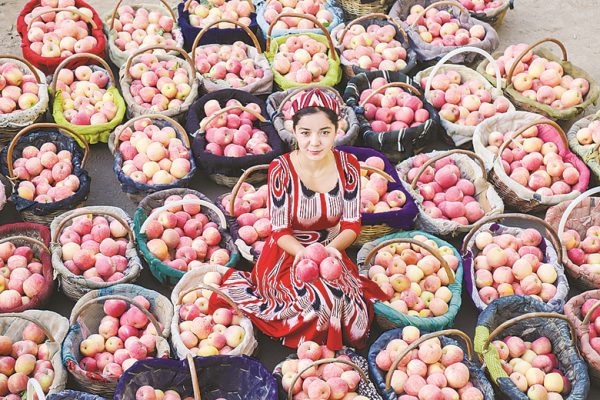
The harsh climate of Aksu prefecture of Northwest China’s Xinjiang Uygur autonomous region is ideal for growing sweet apples. The sugar content of the apples is so high that the inner flesh is translucent.
Although about 600,000 metric tons of apples are grown each year in Aksu, tens of millions of so-called Aksu apples are sold annually. This means that more than 90 percent of these apples bought in stores or online are not actually Aksu apples, a Xinjiang agriculture expert says.
To help Xinjiang farmers use e-commerce, the government of Zhejiang province, a center of e-commerce, has sent experts to help the Aksu farmers learn how to sell online.
Song Yu, a director of Zhejiang’s e-commerce commission and a team member of one such mission to Aksu, says: “In Aksu, e-commerce is at the starting point. It was only in the last year or so that apples from there started being sold online in large quantities.”
Aksu apples have been popular on Alibaba’s Taobao online platform for several years. The competition from non-genuine Aksu apples affects the price that growers of the real Aksu can get for their apples. Farmers get around 4.5 yuan per kilogram, but including transportation, storage and promotion, the total price can be around 16 yuan per kilogram, which is close to the online price, Song says.
“This kills profits.”
In Aksu, roughly 60 percent of people live in rural areas. Most of them are Uygur, and agriculture is their only industry, he says.
“They are not familiar with the national market.. and can’t respond to the market needs in a timely way. They know little of the fast-developing online market,” Song says. The non-genuine apples make the situation worse.
Song gives another example of how not knowing the market hurts farmers. Many farmers heard that dates got a good price last year and chose to plant dates this year, which caused the price to collapse.
An earlier team from Zhejiang helped the locals develop an e-commerce platform that allows the farmers to take advantage of their special products. In 2014, they set up an e-commerce industrial park in the city of Aksu. Using this facility, farmers can sell the apples and other fruit via the internet and improve the efficiency of their businesses.
Thirty-two online stores have joined the Aksu E-commerce Association, which is building storage centers to facilitate sales to big cities. It now has four – in Hangzhou, Zhejiang province; Chengdu, Sichuan province; Yuncheng, Shanxi province; and Guangzhou, Guangdong province.
The association has registered a trademark for Aksu apples and developed a system by which customers can scan the QR codes on the apples’ package to find out whether they are genuine and on which farm they were grown. In 2017, 10,000 metric tons of genuine Aksu apples were sold via the platform.


